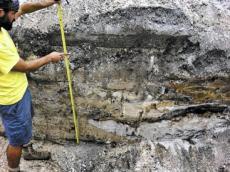|
|
TODAY.AZ / Weird / Interesting
2,000-year-old skeleton found in south Florida
13 January 2014 [15:38] - TODAY.AZ
 In the process of installing a waterline in Davie, Fla., construction crews happened upon a 2,000-year-old, fully-intact skeleton. The bones are thought to be those of a Tequesta Indian woman and according to South Florida's Sun-Sentinel are "perhaps the best-preserved remains of an ancient human uncovered in the past 40 years, authorities said." (Presumably they are only comparing it to other remains found in the region, not the whole world.) The Sun-Sentinel continues:
In the process of installing a waterline in Davie, Fla., construction crews happened upon a 2,000-year-old, fully-intact skeleton. The bones are thought to be those of a Tequesta Indian woman and according to South Florida's Sun-Sentinel are "perhaps the best-preserved remains of an ancient human uncovered in the past 40 years, authorities said." (Presumably they are only comparing it to other remains found in the region, not the whole world.) The Sun-Sentinel continues: "It's either Tequesta or the member of a people that predates the Tequesta," said Bob Carr, of the Archaeological and Historical Conservancy in Davie. "It's unusually well preserved, considering it's been under a highway with thousands and thousands of cars going over it every day."
The woman, about 5 feet tall and about 20 to 30 years old, will now be analyzed by state and local archaeological authorities and then reburied in about a month in a secret location, with Seminole and Miccosukee Indians conducting the ceremony. No artifacts were found with the skeleton, and it had no distinguishing marks to indicate how she died. "There's nothing in the bones to indicate trauma," Carr said.
The analysis will not include DNA or radiocarbon dating, as these would require destruction of bone material, something the current-day Florida tribes are opposed to, the paper reported. There will also be no photos forthcoming:
After the skeleton was unearthed, Seminole and Miccosukee Indian officials requested the discovery remain quiet until Thursday [Jan. 9] and insisted no photos be taken of it.
"This is fairly standard protocol," said Gary Bitner, whose public relations firm represents the Seminole Tribe of Florida. "It's done with an obvious respect for the remains."
Because of a state requirement that all construction sites must be surveyed to ensure no historical objects are destroyed, Carr and other archaeologists have found numerous bones and artifacts. But finding full skeletons is relatively rare.
/Popsci/
URL: http://www.today.az/news/interesting/129892.html
 Print version
Print version
Views: 2403
Connect with us. Get latest news and updates.
See Also
- 07 February 2026 [12:00]
Court allows Trump to detain immigrants without bond - 25 January 2026 [22:33]
Scientists solve 66 million-year-old mystery of how Earth’s greenhouse age ended - 20 January 2026 [14:34]
Spain train crash death toll rises to 41 after high-speed derailments - 19 February 2025 [22:20]
Visa and Mastercard can return to Russia, but with restrictions - 05 February 2025 [19:41]
Japan plans to negotiate with Trump to increase LNG imports from United States - 23 January 2025 [23:20]
Dubai once again named cleanest city in the world - 06 December 2024 [22:20]
Are scented candles harmful to health? - 23 November 2024 [14:11]
Magnitude 4.5 earthquake hits Azerbaijan's Lachin - 20 November 2024 [23:30]
Launch vehicle with prototype of Starship made its sixth test flight - 27 October 2024 [09:00]
Fuel prices expected to rise in Sweden
Most Popular
 Oil and Sargsyan: how Yerevan dreamed of making money from resources of Caspian Sea
Oil and Sargsyan: how Yerevan dreamed of making money from resources of Caspian Sea
 Iran's IRGC claims launching attack on Israeli PM Netanyahu's office
Iran's IRGC claims launching attack on Israeli PM Netanyahu's office
 Erdogan's Ethiopia visit: how Türkiye building power along Red Sea corridor [INTERVIEW]
Erdogan's Ethiopia visit: how Türkiye building power along Red Sea corridor [INTERVIEW]
 Iran’s Ambassador thanks Azerbaijan for support
Iran’s Ambassador thanks Azerbaijan for support
 Serbian diplomats to be evacuated from Iran to Azerbaijan as embassy damaged by shrapnel
Serbian diplomats to be evacuated from Iran to Azerbaijan as embassy damaged by shrapnel
 Total of 192 people evacuated from Iran to Azerbaijan, yet
Total of 192 people evacuated from Iran to Azerbaijan, yet
 US aircraft crash in Kuwait as Iran claims F-15 was shot down
US aircraft crash in Kuwait as Iran claims F-15 was shot down
